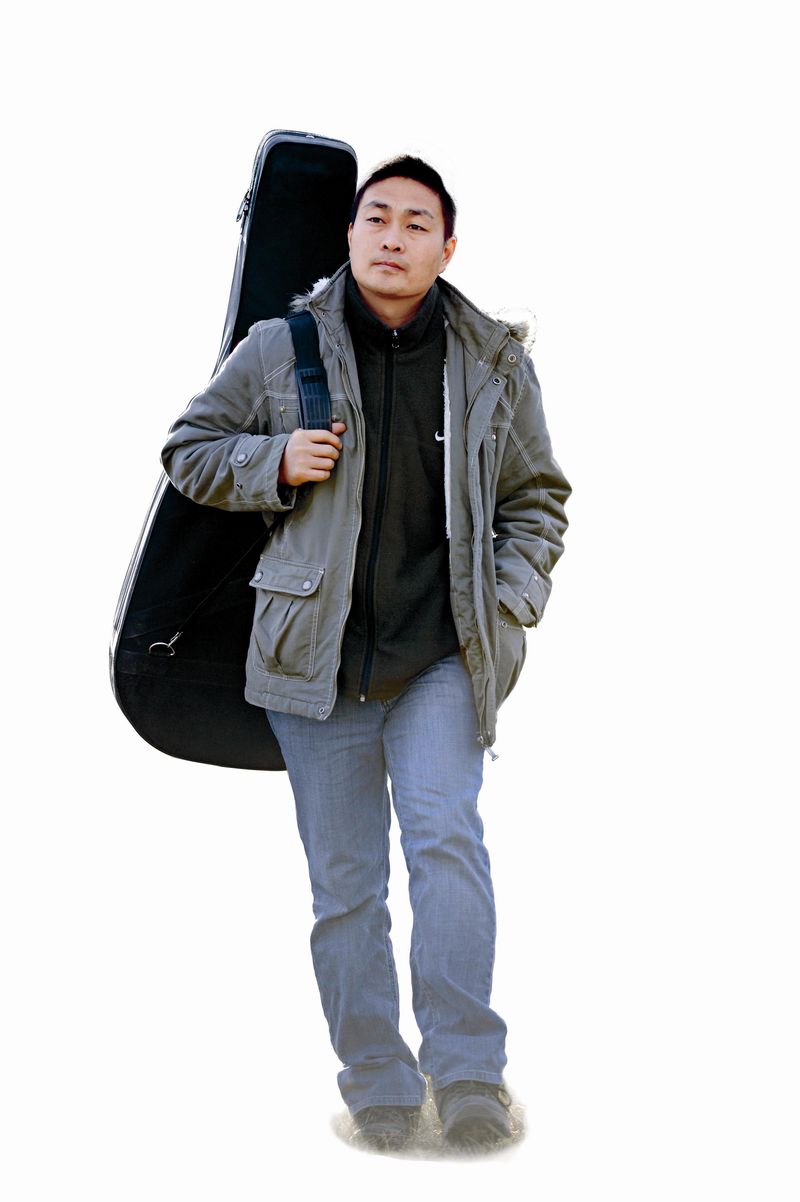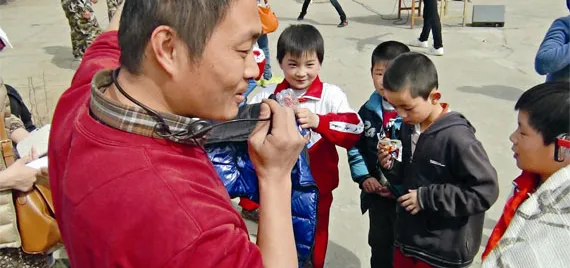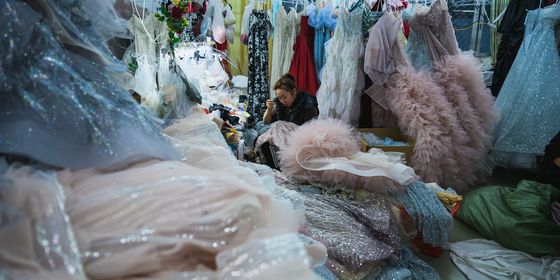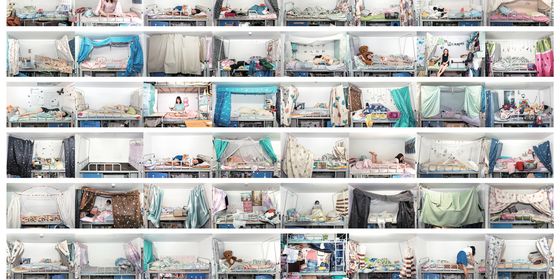An interview with Sun Heng, the founder of the Migrant Workers’ Home
Pioneer Profile
S u n H e n g (孙恒)
Profession: Singer and Social Worker
Nationality: Chinese
In 1998, Sun Heng resigned from his job as a music teacher in a Kaifeng Middle School in Henan Province, coming to Beijing as a migrant worker. On May 1st of 2002, Sun and several of his friends who shared a love of singing, established the New Workers Art Troupe, laying the foundation for the Migrant Workers’ Home (MWH) social organization. “All Migrant Workers are One Family” was their first album, released in 2004. The royalties from this debut album raked in 75,000 RMB, which was then used to build the Tongxin Primary School for migrant workers’ children in Pi Village, more than 40 kilometers from the center of Beijing. The team later got involved in collecting donations: clothes, books and other odds and ends, which they would then sell to the less fortunate for extremely low prices, all under the banner of Tongxin Mutual Beneficial Shops. In 2007, Sun and the other singers in the troupe began the Migrant Worker Culture and Art Museum, which includes such curiosities as temporary resident permits, fine receipts, and factory regulations.
WHAT’S THE STORY BEHIND THE ORGANIZATION?
In 1999, I tramped around the country for a year, made a living as a street singer and casual laborer. I met Brother Biao on a construction site, and I stayed there for three days. Every evening, after work was finished, workers carried their enamel bowls to an empty space and sat together. At that time, I sang songs for them. Brother Biao seldom spoke. For the first two days, he did not say one word to me. On the third day, he put out his hands, full of calluses, and said this to me: “I only have this pair of hands. But I rely on them to feed my children, my wife, and my parents. I work very hard, everyday, extremely tired. When I get tired, I drink jiu. After I drink, I feel homesick. We come from the countryside to the city. We use our hands and sweat to build high-rise buildings and bridges, but so many people look down on us. I don’t understand it. I thought that, as long as I worked hard, my destiny would change, but all year round is hard work. I don’t have anything but these hands.” Brother Biao spoke his mind to me, so I compiled his story into a song so that more people could hear it. I feel that, in this city, we just see the city’s skyscrapers and economic prosperity, but we do not see the story behind them. Migrant workers use effort to construct material wealth, but they are so poor. So, my friends and I set up a troupe to perform in factories and construction sites to enrich their cultural life. As we traveled, we found that migrant workers encountered many difficulties, such as nonpayment of back wages. It’s difficult for their children to be accepted by schools in cities. They want to learn how to operate computers but no place will have them. What can we do? How do we fix this? So, we started the MWH.
WHAT SORT OF ORGANIZATION IS MIGRANT WORKER’S HOME (MWH)? WHAT DO YOU HOPE TO ACCOMPLISH?
It’s a non-profit. My goal is to establish a social support network. In our hometowns, we migrant workers have our own homes; we have parents, brothers, sisters, and friends. Family is a support network for an individual in a community. When we have a home and family, we can help each other when we encounter difficulties. When we leave our hometown to work in a new city, we do not have this relationship. There is no home for us, and nobody cares about us. We realized that we needed to build a home in the city; this home is a social support network. As long as we have support, when we encounter problems, we can care for each other, help each other.
YOU’VE WRITTEN A LOT OF SONGS ABOUT MIGRANT WORKERS. HOW DO THEY INSPIRE YOU AND WHICH SONG IS YOUR FAVORITE?
My songs tell stories with simple words. They are the stories of migrant workers, such as the story of Brother Biao. My favorite song is “Unite as One to Get our Wages Back”. Behind the song, there is a story of 80 migrant workers; they worked for a year without payment. To get their money, they occupied the constructive site, from dusk till dawn, and negotiated with the boss. Their boss first sent in “spies” from

another construction site amongst them to try to encourage infighting. Then, the boss threatened to call the police, saying they would all be arrested. But they weren’t tricked, and they got their payment. I love this song because I think our labor derserves to be respected, and this was a successful experience, very encouraging. So, I often sing this song to workers on construction sites. Today, in the construction industry, back wages are still a common problem because of the industry’s subcontracting system. Each project turns into a lot of subprojects. Then, those labor relations are shifted again. Workers and employers don’t have a direct labor contract. If there is no labor contract, it means no labor relationship. So, the wages don’t get paid at all, and it is a huge disadvantage for workers in court. How can we change this situation? There are many approaches. What I can do is sing these songs to workers and enhance their awareness in maintaining their legal rights.
IS THERE ANYTHING YOU WANT TO TELL US ABOUT THE NEW WORKERS ART TROUPE AND OF YOUR PERFORMANCES?
Our troupe performs mainly in the Beijing area as most of our members are working in Beijing and use their spare time to perform. We also hold tours all over the country. Since 2002, we have had over 500 performances and made seven albums. I remember, one year, on Mid-Autumn Festival night, we performed for restaurant waiters. They are very busy on holidays. So we waited and waited until they got off work. It was nearly midnight. Our performance lasted one hour, and the neighbors complained about us because it was too noisy. We had to stop in the end, but the young waiters were reluctant to let us go. So, we ran into the street and we walked and sang together until dawn.
THERE ARE SO MANY ORGANIZATIONS UNDER MWH. HOW DO YOU MANAGE THEM ALL?
We have different divisions. For each organization, we have a special team with mutual assistance and cooperation. Every week, our Development Committee holds meetings to make major decisions for the future. I am currently the director general of MWH. My job is to coordinate different divisions, media receptions, and, of course, I’m in charge of the troupe’s performances.
WHAT CAN ORDINARY PEOPLE DO TO HELP MIGRANT WORKERS IN CHINA?
Well, I’m an ordinary person. In my opinion, the first step is to respect migrant workers. You should have a basic understanding of them. If there is no willingness to understand their situation, then what can you do? In order to understand them, you should pay attention to them. As long as you pay attention to them you’ll know what to do. If everyone does a little, it will cause a wave of change.
MORE AND MORE MIGRANT WORKERS ARE RUSHING TO THE CITY FOR WORK. WHAT DOES MWH HAVE IN MIND FOR THE FUTURE?
This year, from September 6 to 8, we will hold a Migrant Workers’ Culture and Arts Festival in Beijing. We encourage workers to create, to express, and to show their true thoughts and feelings in a cultural and artistic way. In addition, we have a plan to expand the current scale of our training center because the new generation of post-80s and post-90s migrant workers are roughly 100 million strong in China. Once they begin to work in a factory, they rarely have a chance to retrain in a new skill, so we founded this training center—I’d like to call it the University of Migrant Workers. It is not a formal academic university, but rather a social knowledge platform. It has semi-annual terms and there have already been eight terms. Our training has two parts. One is employment-related, such as computer skills and graphic design. The other is related to the value of labor and social skills. After graduation, all students can join the alumni association. When they encounter difficulties and setbacks in life, they can make full use of regular network meetings to get support, and they can also get help and support from each other. We have basic teaching conditions, but right now the scale is so small. We can only accept about 30 students each term. The trainees are 16 to 25-year-olds. In the future, we will expand to provide more opportunities.












